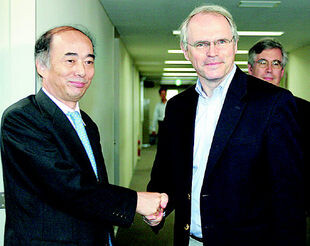hankyoreh
Links to other country sites 다른 나라 사이트 링크
[Analysis] Japan dissatisfied with nuclear dialogue

TOKYO-While there are signs of optimism and a thaw on the Korean peninsula as North Korea began to fulfill its promise to denuclearize, per the Feb. 13 agreement of the six-party talks, relations between North Korea and Japan are still frosty, leaving some Japanese to voice concern over Japan’s potential diplomatic isolation.
When North Korea fired seven ballistic missiles, including the Taepodong-2, into the East Sea on July 5 last year, the Japanese government, led by then chief cabinet secretary Shinzo Abe, took immediate steps to impose sanctions against North Korea. On the same day of the missile tests, Japan banned the North Korean vessel Mangyeongbong from entering its ports and played a leading role in the United Nations adopting a resolution against North Korea.
Three months later, as North Korea conducted its first nuclear test, the incumbent Japanese prime minister Abe imposed further economic sanctions and other restrictions against North Korea by prohibiting North Korean people and goods from entering the nation and exports of Japanese luxury goods to the North.
Though it has not yet been successful, the Japanese government was rapidly moving to change its constitution, which officially bans Japan from having a military, to adopt the U.S.-led Missile Defense system. The United States, meanwhile, had seemed to show an attitude of support for Japan’s hostile policy against North Korea.
However, the situation changed after the U.S. switched its policy on North Korea to dialogue from pressure. After the dispute over the North’s frozen funds at Macau-based Banco Delta Asia had been resolved, North Korea began taking steps to implement the February 13 agreement. The result has been that Japan’s hostile policy against North Korea is now losing direction and some Japanese media outlets have raised concerns over Tokyo’s diplomatic isolation. On July 5, the Yomiuri newspaper, which supported the Abe government, pointed out that Japan’s diplomacy is being tested over the North’s nuclear standoff and abduction issues.
Japan’s somewhat awkward position was highlighted on June 25, when U.S. Assistant Secretary of State Christopher Hill, who had made a surprise visit to Pyongyang June 22 to 23, said that plans for peace process on the Korean peninsula would be discussed among South Korea, North Korea, the U.S. and China once ‘‘we get into the disabling phase’’ on the North nuclear program.
As Hill had excluded Japan from the list of nations, Abe was upset and in apparent anxiety because this shift in leadership could darken Japan’s prospects for resolution of the abduction issue. Abe replied on June 27 that North Korea would not be accepted by the international community, if Japan were to be excluded from the talks. On July 4, the North’s official Korea Central News Agency urged Japan to pull out of the six-nation talks, saying ‘‘From where things stand now, Japan’s participation in the six-party talks is an unstable factor.’’
‘‘The Japanese government’s hostile policy helped put the North’s nuclear problem on the negotiating table, but it didn’t help Japan resolve the abduction issue,’’ North Korea expert Noriyuki Suzuki, director of Radio Press, said in a telephone interview with The Hankyoreh, referring to the fact that North Korea had admitted to kidnapping Japanese citizens, only to release five of them. He said the Japanese government’s North Korean policy has lost balance in diplomacy, adding that the abduction issue should be resolved through dialogue.
On July 29, the result of upper house elections may be a watershed in Japan’s North Korean policy. If the Japanese prime minister, with support ratings in the low-30th percentile, steps down after failing to survive in the July elections, the new government would have no choice but to change Japan’s North Korean policy. Even if Abe survives, many say the Japanese government may not have enough leadership and power to continue its hostile North Korean policy.
Please direct questions or comments to [englishhani@hani.co.kr]
Editorial・opinion
![[Editorial] Does Yoon think the Korean public is wrong? [Editorial] Does Yoon think the Korean public is wrong?](https://flexible.img.hani.co.kr/flexible/normal/500/300/imgdb/original/2024/0417/8517133419684774.jpg) [Editorial] Does Yoon think the Korean public is wrong?
[Editorial] Does Yoon think the Korean public is wrong?![[Editorial] As it bolsters its alliance with US, Japan must be accountable for past [Editorial] As it bolsters its alliance with US, Japan must be accountable for past](https://flexible.img.hani.co.kr/flexible/normal/500/300/imgdb/original/2024/0417/6817133413968321.jpg) [Editorial] As it bolsters its alliance with US, Japan must be accountable for past
[Editorial] As it bolsters its alliance with US, Japan must be accountable for past- [Guest essay] Amending the Constitution is Yoon’s key to leaving office in public’s good graces
- [Editorial] 10 years on, lessons of Sewol tragedy must never be forgotten
- [Column] A death blow to Korea’s prosecutor politics
- [Correspondent’s column] The US and the end of Japanese pacifism
- [Guest essay] How Korea turned its trainee doctors into monsters
- [Guest essay] As someone who helped forge Seoul-Moscow ties, their status today troubles me
- [Editorial] Koreans sent a loud and clear message to Yoon
- [Column] In Korea’s midterm elections, it’s time for accountability
Most viewed articles
- 1[Column] The clock is ticking for Korea’s first lady
- 2Samsung barricades office as unionized workers strike for better conditions
- 3[Editorial] When the choice is kids or career, Korea will never overcome birth rate woes
- 4[Editorial] As it bolsters its alliance with US, Japan must be accountable for past
- 5S. Korea, Japan reaffirm commitment to strengthening trilateral ties with US
- 6[Guest essay] How Korea turned its trainee doctors into monsters
- 7Japan officially says compensation of Korean forced laborers isn’t its responsibility
- 8Why Israel isn’t hitting Iran with immediate retaliation
- 9Worse than worst case: Korea’s population is shrinking faster than predicted
- 10[News analysis] After elections, prosecutorial reform will likely make legislative agenda